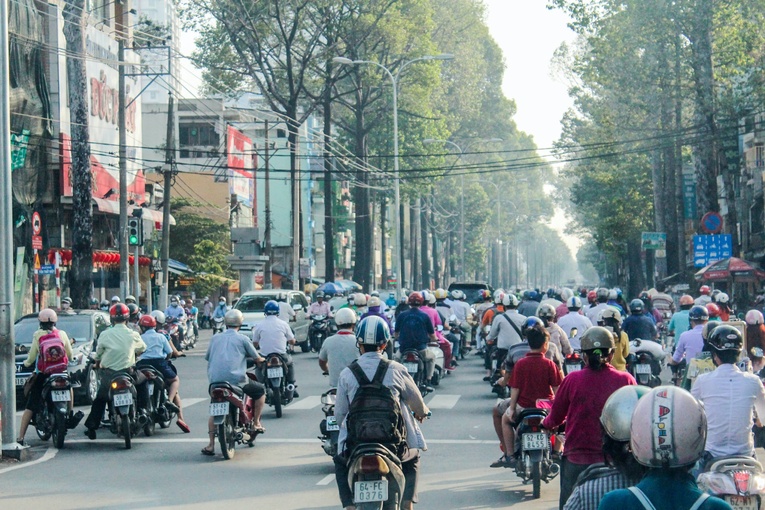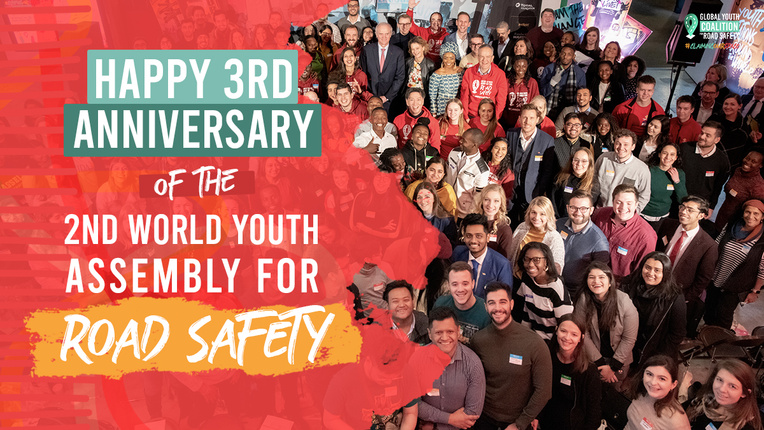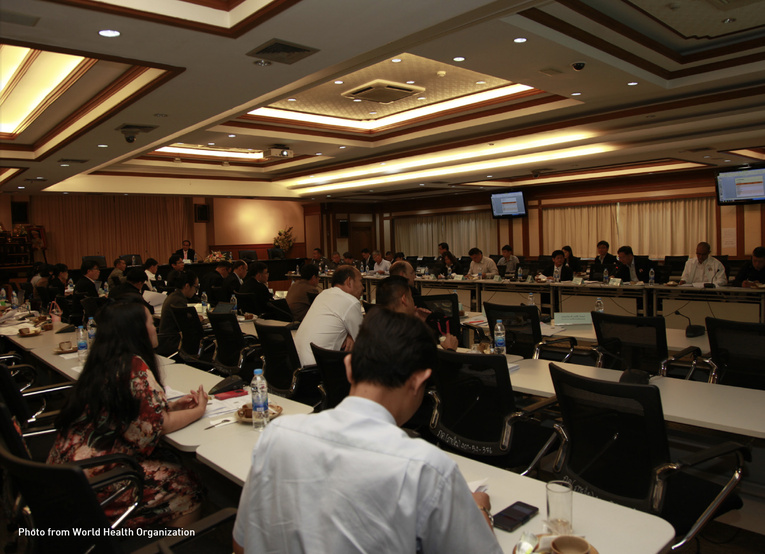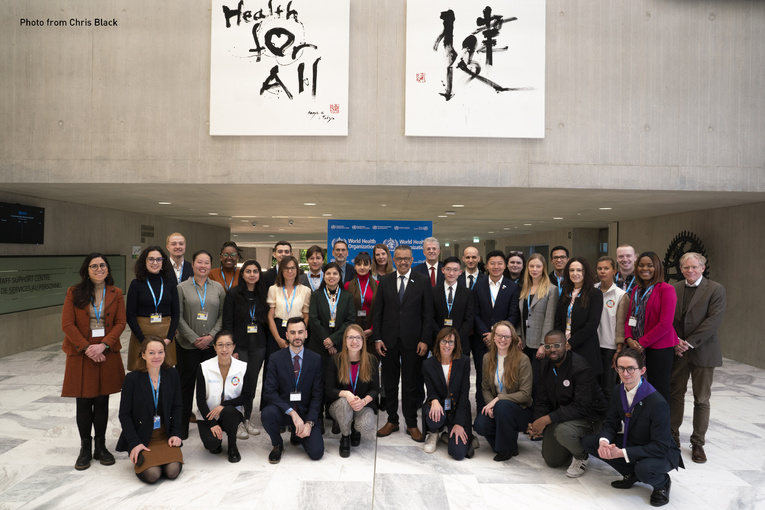
Meet our Local Actions Winners 2023!
After weeks of discussion and assessment, we finally have the 15 youth-led Local Actions projects that we will fund and support this 2023. Our youth leaders have presented some innovative ideas to improve road safety and sustainable mobility in their communities through their proposals and we can’t wait to see them implemented on the ground! Meet our winners below and check out their project proposals;
 Agita Pasarib, Indonesia
Agita Pasarib, Indonesia
Agita is the founder and Executive Director of Bullyid Indonesia, a global award tech charity focusing on empowering victims of harassment with digital psychological and legal support. Her contribution and commitment to youth empowerment in digital governance and cyber harassment prevention have been recognized and celebrated globally. Agita received her LL.B in Criminal Law from the University of Indonesia. Fred J Hansen Institute then awarded her to continue the exclusive leadership program at the University of San Diego.
 Adrián Marcelo Galindo Marcos, Mexico
Adrián Marcelo Galindo Marcos, Mexico
Adrián works as a project coordinator for Movimiento de Activación Ciudadana, A.C. or MOVAC. In his role, he manages resources for the construction of comprehensive projects that focus on safe mobility and citizen participation. His aim is to integrate the social component into the projects he handles by presenting different ways in which the project can support the improvement of roads in the area and ensure that street design helps fulfill fundamental human rights in safety and mobility.
 Ana Magdalena Rodríguez Gómez, Mexico
Ana Magdalena Rodríguez Gómez, Mexico
Ana is a 33-year-old urbanist architect who works as an independent consultant and university teacher. Her journey began ten years ago when she served as an urban activist in Monterrey City. She eventually extended her reach to a national level of architecture and urbanism through her position in Liga Peatonal. She moved to Guadalajara to pursue a Master’s Education where she completed research on Transport Oriented Development (TOD) as a development tool in Monterrey.
 Chilekwa O’Brien, Zambia
Chilekwa O’Brien, Zambia
Chilekwa is a 26-year-old demographer and road safety advocate working as a research evaluation associate at Zambia Road Safety Trust (ZRST) in Zambia. Chilekwa is passionate about promoting active and sustainable mobility to reduce the risk of traffic-related injuries and fatalities, particularly among vulnerable road users. His work involves conducting research and evaluating road safety programs, with a focus on identifying effective strategies to improve safety and reduce risk on the roads.
 Maryfely Rincón, Colombia
Maryfely Rincón, Colombia
Maryfely is a 24 years old urban Manager from the Universidad del Rosario. She currently works as a project coordinator at Despacio where she works as a data analyst, content creator, and content manager. She also works as the creator and editor of documents and publications related to road safety, and urban and active mobility. “I proposed this project because I believe that we can’t ignore the fact that people are still dying on the roads every day. No one should die from road crashes! Especially young people and children.”
 Dilshod Kholmatov, Tajikistan
Dilshod Kholmatov, Tajikistan
Dilshod is from Dushanbe, Tajikistan. He graduated from the Tajik Technical University where he studied Civil Engineering and Architecture. He was a semi-professional road and mountain bike cyclist and has traveled to many places by bicycle. Dilshod is a co-founder of the Critical Mass Dushanbe which was established 7 years ago with two international colleagues. Dilshod currently works as a project manager in road safety and post-crash response. He is a candidate to become a Chess Master and is interested in learning new languages.
 Oliva Nalwadda, Uganda
Oliva Nalwadda, Uganda
Oliva is a researcher, public health advocate, and road safety champion with over 8 years in designing and leading local actions geared towards youth empowerment in road safety promotion. She is the founder of Uzima Ari Uganda, an organization currently fast-tracking the realization of Sustainable Development Goals (SDGs) 3, 4, and 13. Oliva also currently serves as a Youth Leadership Board Member of the Global Youth Coalition for Road Safety.
 Edmond Atwine, Uganda
Edmond Atwine, Uganda
Atwine currently works with the Uganda Road Accident Reduction Network Organization (URRENO) as a logistics officer and research assistant. “Working with URRENO has exposed me to several challenges within the transport sector some of which I strongly believe can be reversed through advocating for the promotion of NMT infrastructure usage in Kampala. The experience and skills I acquired at URRENO paired with my passion for road safety promotion motivated me to lead and mobilize youth to take part and cause the necessary changes.”
 Jacob Smith, United States of America
Jacob Smith, United States of America
Jacob is a diehard visionary movement builder. He has his own consultancy in road safety and mobility justice which delivers high-impact community organizing for transforming mobility access in BIPOC (Black, Indigenous, and People of Color) communities. He currently serves as the Executive Director of the National Organizations for Youth Safety (NOYS). Since 2014, he has presented at over 190 conferences and led projects in 12 states, mobilizing youth for safe and sustainable communities.
 Alida Paola Becerra García, Mexico
Alida Paola Becerra García, Mexico
Alida was born in Mérida, Yucatán in 1989. She is a 33-year-old feminist activist with a degree in Psychology from the Autonomous University of Yucatán. Paola specializes in group and collaborative processes. She has collaborated with the Reflexión y Acción Feminista (RAF) collective since 2014 and is currently coordinating the programs of women and territory. She has been an urban cyclist since 2010 and utilizes her experience as a female cyclist in Mérida to support and encourage other women to become cyclists.
 Marwa Chacha Magoti, Tanzania
Marwa Chacha Magoti, Tanzania
Marwa is 31 years old and currently works as an automobile engineer. He also works with the Ministry of Works and Transport in Tanzania as a transport safety Officer in the Directorate of Transport, Environment, and Safety. He is a Ph.D. candidate at Hasselt University and the National Institute of Transport (NIT) in Tanzania. He was first employed in TEMESA, Tanzania in 2018 where he then proceeded to the University of Hasselt, Belgium for his master’s program in Transport Science in Traffic Safety.
 Sallam Alnawaiseh, Jordan
Sallam Alnawaiseh, Jordan
Salaam is an experienced Project Officer and Civil Engineer with a passion for promoting positive change in her community. She has been working in the field of community development for over three years and is currently working as a Project Officer at a local non-profit organization in Jordan, where she is responsible for managing community projects and ensuring their successful implementation. She has a strong background in Business and Entrepreneurship, Community Engagement, and Women’s Empowerment, which has allowed her to excel in her current role.
 Stephen Kome Fondzenyuy, Cameroon
Stephen Kome Fondzenyuy, Cameroon
Stephen is a 26-year-old civil engineer and a Ph.D. candidate at the University of Rome. He is inspired by the need to curb the global challenge of road crashes in developing countries and, as a result, pursues research on speed management for low- and -middle-income countries. Together with his research group he develops and provides innovative road safety solutions in different African regions. He is an advocate for international development and has experience at the World Bank as a transport consultant.
 Valeria Belén Cerpa Salas, Peru
Valeria Belén Cerpa Salas, Peru
Valeria has experience in web development and research. She developed social and technology-related projects brought on by her love for coding and programming. She advocates for the resilience of cities and communities in Peru and works as a developer at the US-based organization Planning 2050. She has been a U.S. Green Building Council (USGBC) intern, Global Initiative Against Transnational Organized Crime (Gi-Toc) Fellow 21´, Community Engagement Exchange (CEE) Fellow 22´, One Young World (OYW) Delegate 22´, and University of Computer Studies, Mandalay (UCSM) research assistant 21´.
 Tevoh Ndingwan, Cameroon
Tevoh Ndingwan, Cameroon
Tevoh holds a Master’s Degree in civil engineering and works as a road safety engineer. He performs road safety audits and inspections in rural and urban areas in Cameroon while coordinating regional road safety public education programs and campaigns. Through his work, he is able to analyze and prepare safety reports on road safety. He faced different road safety challenges while commuting to schools and witnessed the various crash incidents his colleagues have suffered.














